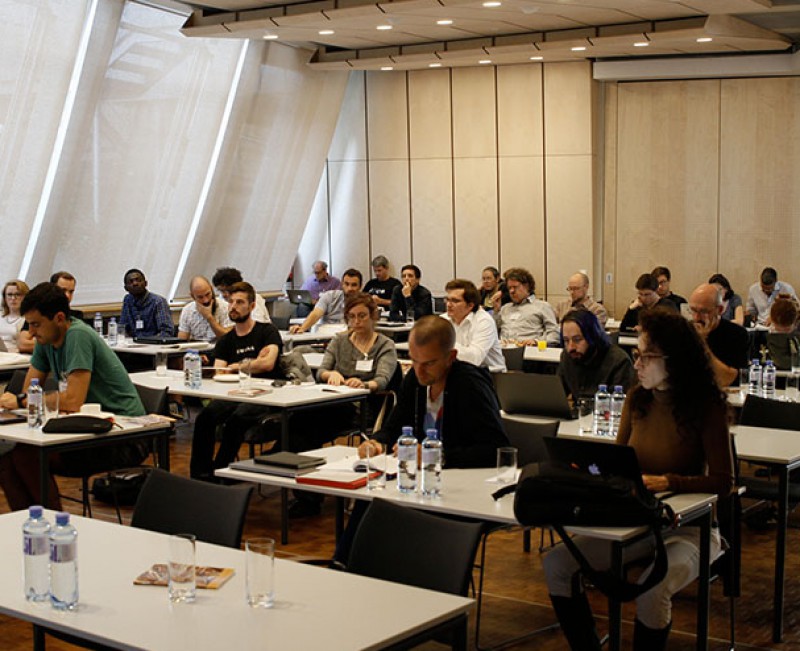The "Altenberg Workshops in Theoretical Biology" address key questions of biological theories. Each workshop is organized by leading experts of a certain field who invite a group of international specialists to the KLI. The Altenberg Workshops aim to make conceptual progress and to generate initiatives of a distinctly interdisciplinary nature.
Event Details

Call for Applications
8th European Advanced School in the Philosophy of the Life Sciences (EASPLS)
“Philosophy of biology for a healthy planet”
deadline for applications extended to 31 January 2026
Venue & dates
KLI (Klosterneuburg, Austria, https://www.kli.ac.at), September 7-11, 2026
Directors
Sabina Leonelli (Technical University of Munich) and Thomas Reydon (Leibniz University Hannover).
Keynote speakers
Alkistis Elliott-Graves (Bielefeld University; https://alkistis-elliott-graves.net) and Julie Jebeile (University of Bern; https://juliejebeile.net).
Applications
Applications should include a letter of motivation (max. 500 words), an abstract of your current research (max. 500 words) and a short CV (max. 3 pages). Please send applications as a single PDF to EASPLS2026@philos.uni-hannover.de (the deadline for applications is 31 January 2026).
Registration
Registration fees will be 350 €. The summer school will cover lunches and two dinners. Participants should arrange their own accommodation and travel expenses. The EASPLS consortium may be able to provide some financial support for participation. For inquiries please write to EASPLS2026@philos.uni-hannover.de.
About the summer school
The European Advanced School for the Philosophy of the Life Sciences (EASPLS) is a biennial one-week summer school that aims at fostering research, facilitating collaborations, and providing professional training to students in the field of the philosophy, history, and social studies of the life sciences, broadly construed. The summer school includes lectures by invited keynote speakers as well as by senior researchers fromthe organizing consortium, group work, and general discussions. Special sessions will be dedicated to career and skills development.
The summer school is aimed at early-career researchers working on any topic in the philosophy, history, and social studies of the life sciences, but every edition of EASPLS has a focus theme. The 2026 focus theme is “philosophy of biology for a healthy planet”. Our planet is increasingly facing threats of climate emergency, biodiversity depletion and anthropogenic harms to life cycles around the globe, with challenges including a radical threat to the "health, maintenance and future of the web of life on planet Earth” (UNESCO – Encyclopedia of Life Support Systems). This situation raises the question what it means to lead a healthy life on a threatened planet, what the goal of a “healthy planet” would encompass, and how scientific research may contribute to achieving it. Never before has biological research been under more pressure to address what may constitute healthy living, under which conditions healthy living can still be achieved, and for which species and ecosystems a concept of healthy living can be applied. The philosophy of the life sciences can and should play an important part in addressing such questions.
Participants will be able to present their own research and there will be ample time for discussion on participants’ own topics, but participants will also be asked to reflect on how their work could contribute to achieving a “healthy planet”. Questions asked in this context may comprise, but are not limited to:
- How can personal health be defined under changing environmental conditions?
- How can planetary health - a “healthy planet” - be understood?
- Is health always a positive goal? Whose health, and how?
- What methods and models best suit the investigation of health x environment interactions?
- What are key concepts when studying planetary health and health x environment interactions, and what conceptual work needs to be done on them?
- To which extent ought different parts of biology take environmental stressors into account?
- Do current global challenges, such as those concerning health, affect key elements of biological research such as explanations, theories, methods and/or models?
- What forms of data-intensive research are best suited to investigate (human, multi-species and/or planetary) health?
- How can the various life sciences (in particular those that do not immediately relate to (bio)medicine) contribute to healthy living?
- What normative, socio-economic, conceptual and/or institutional stakes underpin appeals to health, and with which implications?
- How can philosophical work on the life sciences contribute to planetary health?
The EASPLS is organized by a European consortium of top-level institutions in the philosophy, history and social studies of the life sciences. The consortium currently encompasses nine institutions in seven countries:
- Institute of Philosophy & Centre for Ethics and Law in the Life Sciences (CELLS); Leibniz University Hannover, Germany
- TUM School of Social Sciences and Technology; Technical University of Munich, Germany
- Geneva Centre for Philosophy of Science, Department of Philosophy; University of Geneva, Switzerland
- Egenis, the Centre for the Study of Life Sciences; University of Exeter, UK
- IAS Research Centre for Life, Mind and Society; University of the Basque Country, Spain
- Institute for Philosophy in Biology & Medicine & ImmunoConcEpT Lab; University of Bordeaux & CNRS, France
- Institute for the History and Philosophy of Science and Technology (IHPST); University of Paris 1 Panthéon-Sorbonne, France
- Section for History and Philosophy of Science, Department of Science Education; University of Copenhagen, Denmark
- Konrad Lorenz Institute for Evolution and Cognition Research (KLI), Klosterneuburg, Austria.


